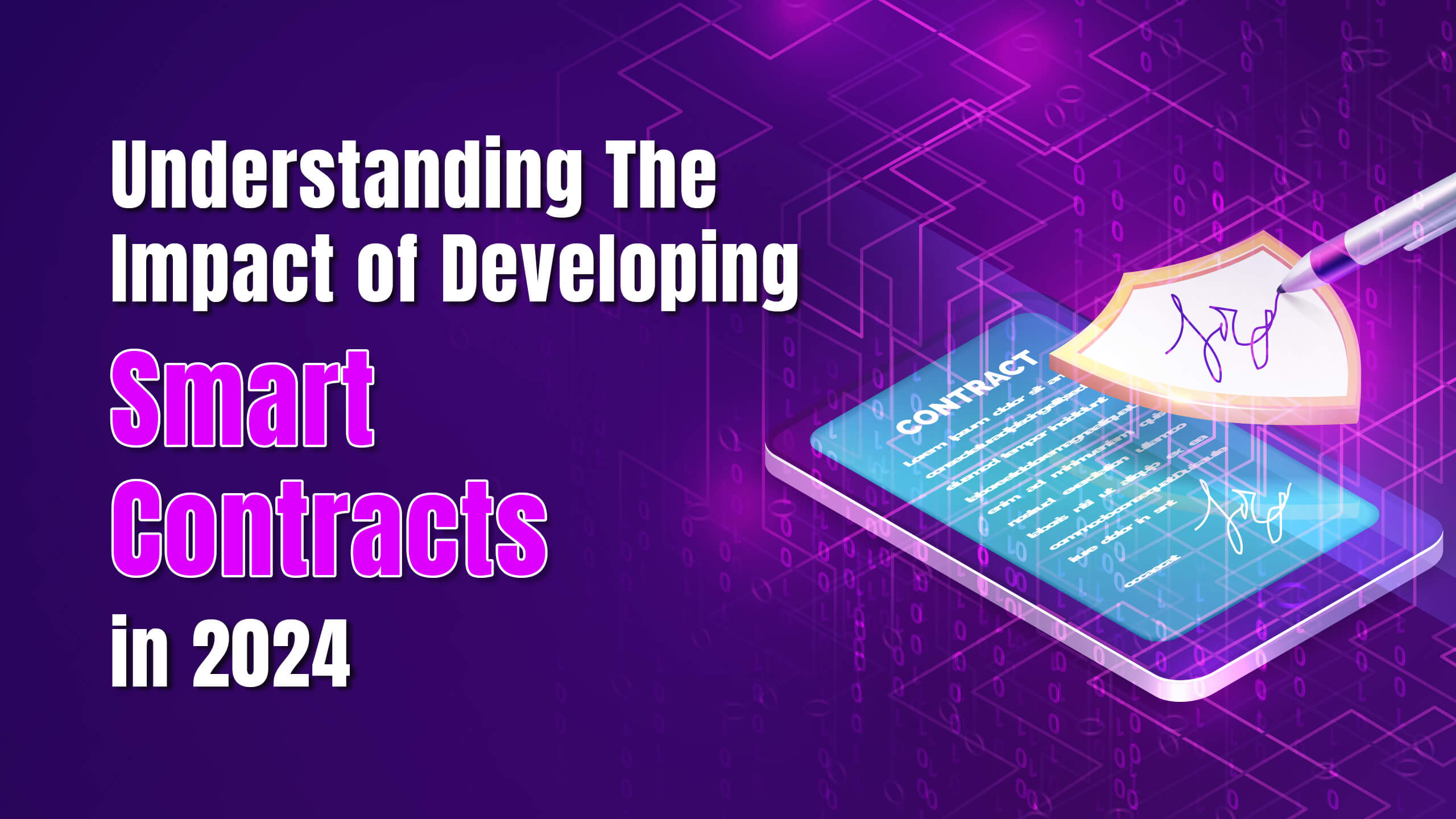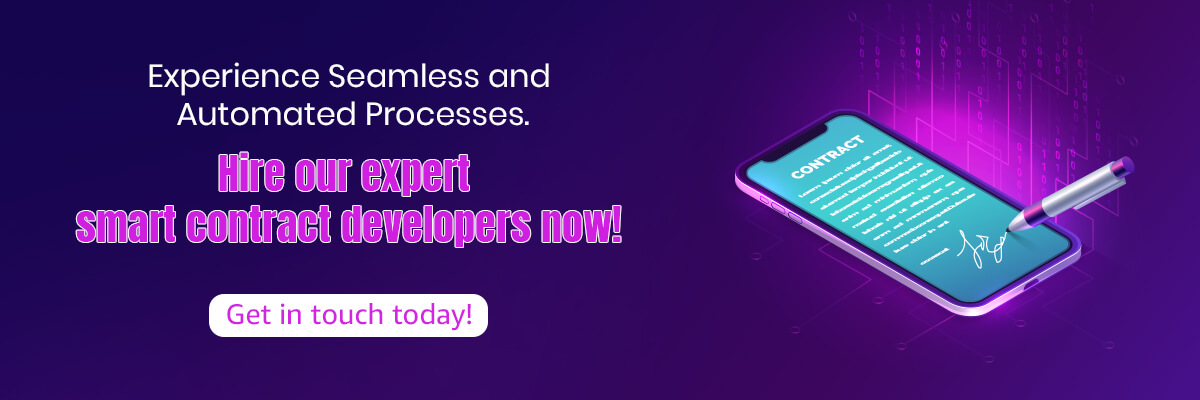Smart contract development is the elaboration, coding, and validation of digital contracts capable of being executed autonomously on a Distributed Ledger Technology network. It encompasses formulation and implementation of the rationale, rules, and limitations that govern these contracts to enable them to perform contracts on their own without the input of an individual. Developing smart contracts often involve using blockchain systems, for example, Ethereum, which offer decentralized, secure, and transparent transaction records. Because of this it has led to improvement in productivity, cost reduction, and enables trustless transactions, and has revolutionized several segments.
Explore the Significance of Smart Contract Development
When the conditions of a specific smart contract are met, this functionality quickly executes the desired outcome. The use of smart contracts involves the use of computer codes that are programmable to execute business transactions once conditions have been met.
Using smart contracts on the blockchain provides anonymity of counterparties and enables the exchange of information as well as the execution of business transactions without relying on such trustworthy third parties. Below is a summary of the specific advantages that can be obtained by developing smart contracts.
-
The Removal of Intermediaries
Intermediaries are involved in the facilitation and supervision of transactions in conventional applications. This creates new points of failure and security risks. Because the smart contract is executed automatically and trust is built through code and encryption, middlemen are eliminated. Because there are fewer middlemen, there is a smaller attack surface, increasing the application’s defense against outside attacks.
-
Transaction Speed
Smart contracts’ foundations demonstrate that they are entirely automated and dependent on software logic. The primary advantage of smart contracts is their ability to eliminate middlemen seen in traditional contracts. As a result, smart contracts may carry out transactions immediately without needing to wait for several approvals or manual document processing. Thus, developing smart contracts can aid in reducing the amount of time needed for certain traditional business procedures.
-
Intact Data Security
As smart contracts are implemented on a decentralized network, they provide complete data security. This indicates that the data is dispersed among a network of computers and that there isn’t a single point of failure. Furthermore, smart contracts are encrypted and may only be accessed with a private key.
They are hence immune to data theft and hacking. Businesses need to investigate the advantages of developing smart contracts as more stakeholders and consumers want stronger data protection and more control over their digital assets.
-
Transparency
There is less possibility that the terms of the contract will be modified because all parties are aware of the same information at the same moment. Because smart contracts are built on blockchain technology, which guarantees the immutability of data, they may be constructed without the requirement for mutual knowledge. This also helps to prevent errors in contract administration and execution and any conditional breaches.
Because transactions are duplicated so that all parties have a record, this transparency gives the parties security and confidence. Smart contracts have access to data and information about the contract for the duration of the agreement.
-
Reliability
The concept of trust is emphasized by the positive aspects of smart contracts. Automated smart contracts ensure that transactions are completed on schedule and within preset constraints. Furthermore, the security and transparency offered by developing smart contracts reduce the likelihood of error, bias, or manipulation. Smart contracts are reliable for automatic execution based on pre-established criteria for businesses.
Discover Beneficial Sectors with Developing Smart Contracts
Blockchain-based smart contracts are becoming a game-changing concept for a variety of sectors. With the terms included directly into the code, these are contracts that operate autonomously.
Because they enable decentralized applications and automate intricate transactions, smart contracts are most commonly used in the context of cryptocurrencies. Examine the most popular applications of smart contract usage to provide insight into the circumstances in which they work most effectively.
-
Banking & FinTech
Smart contracts are a vital instrument for a variety of financial workflows and activities in FinTech and banking solutions. Through the automation of disbursement and payback monitoring, developing smart contracts assists in streamlining operations by reducing the need for labor-intensive documentation and verification processes that are often present in the banking industry.
In addition, smart contracts speed up P2P and cross-border transactions and help with identity verification. These smart contract use cases have also played a major role in the development of decentralized finance (DeFi). Support for DeFi protocols allows direct peer-to-peer lending and token trading on decentralized markets.
-
Supply Chain Management
Different forms of fraud activities, poor performance, and a lack of proper accountability in the global supply chain have been prevalent for many years. This industry needs a change of guard because smart contracts offer end-to-end transparency and automation of contract management between manufacturers, distributors, suppliers, and retailers.
Blockchain enables stakeholders to oversee and confirm every phase of the supply chain. Developing smart contracts also decreases latency, ensures identity, and prevents counterfeit production due to the system’s immutable and transparent nature.
-
Healthcare
Smart contracts can be used to ensure safe and effective processing of medical data, insurance claims, and payments. Smart contracts ensure privacy and lower the risk of data breaches by allowing patient data to be safely kept and accessed by authorized parties. Healthcare businesses may simplify the exchange and accessibility of patient details among various providers while upholding data privacy and integrity by utilizing smart contracts.
Furthermore, pay-for-performance and value-based contracts—two cutting-edge healthcare finance models. They align incentives between payers and providers and advance the provision of high-quality care that can be made possible by developing smart contracts.
-
Real Estate
Smart contracts speed up transactions and eliminate a lot of paperwork in the real estate industry by facilitating property transfers. They resolve frequent title dispute difficulties by offering a clear lineage of property ownership using the immutable ledger of blockchain technology.
Regarding rentals, smart contract use cases include automated maintenance requests and rent collection, as well as making sure the conditions of the lease are followed. Developing smart contracts can also facilitate crowdfunded real estate endeavors, which let several investors work together to jointly fund real estate projects and split the profits.
-
Intellectual Assets
In the digital era, intellectual property rights have long been a problem. By providing visible and unchangeable records for the protection of creative works, smart contracts provide an answer for authors, artists, and other creators. These agreements have automated enforcement of royalty payments, license conditions, and copyrights.
By doing away with middlemen like copyright attorneys and agencies, smart contracts not only empower artists but also improve accountability and promote a more equitable profit distribution.
Conclusion
Developing smart contracts guarantees efficiency, security, and automation, which transforms transactions. These self-executing contracts simplify transactions and increase transparency by utilizing blockchain technology. Smart contracts automate workflows in a variety of sectors and are crucial for decentralized applications.
Smart contract development has great promise for revolutionizing digital interactions and worldwide corporate operations in the future, with a focus on trust and dependability.





